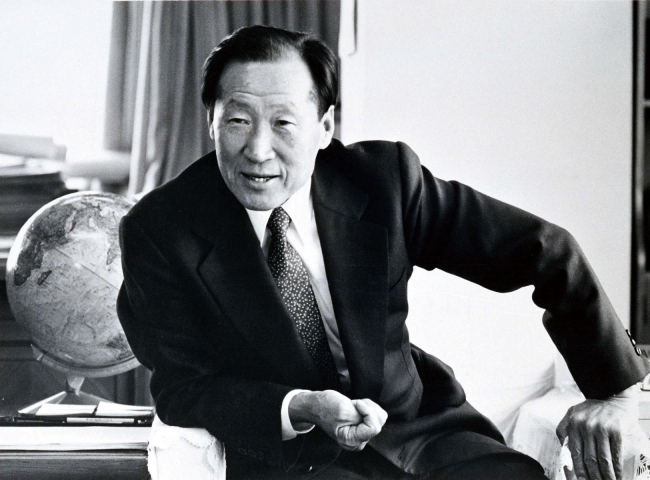[Newsmaker] Hyundai to commemorate 100th anniversary of founder
By KH디지털2Published : Nov. 19, 2015 - 17:49
Hyundai Motor Group and other Hyundai family companies kicked off a weeklong commemoration of the 100th birth anniversary of its founder Chung Ju-yung at the Seoul Arts Center on Wednesday night, with a performance of the world-famous orchestra Staatskapelle Dresden on Beethoven’s second and third symphonies, better known in Korea as “Hero Symphonies.”
The family members of the Hyundai empire, who attended the first memorial event, included Hyundai Heavy Industries owner Chung Mong-joon, the sixth son of the late founder; Hyundai Motor Group vice chairman Chung Eui-sun, the eldest grandson; and Hyundai Group chairwoman Hyun Jeong-eun, daughter-in-law of the late Chung.
In addition to the music concert, the group will host a variety of events including a photo exhibition and an academic symposium to give the public a chance to learn about the life of Hyundai’s patriarch and his achievements in different sectors of the Korean society until his centennial birthdate on Nov. 25.
Chung Ju-yung, who is also known by his penname Asan, the same name of his small, rural hometown in what is now North Korea, had made big strides in Korea’s modern history as a visionary business leader until his death on March 21, 2001, at age 86.

Accompanying the nation’s economic development, the late Chung exemplified the “miracle” of the Korean economy that grew from the ashes of the Korean War to the world’s 12th-largest economic powerhouse in a half century.
Born to a large impoverished family of peasants on Nov. 25, 1915, during the Japanese colonial era, the late Chung began his career at age 18 by selling rice.
Eventually, he made enough money to found Hyundai Motor Industrial in 1946 and Hyundai Civil Industries in 1947, targeting the construction market after the liberation of Korea from Japan’s colonial rule.
After the Korean War, his set up Hyundai Construction and Engineering in 1960 to capitalize on the reconstruction boom. With the business, the company contributed to the start of Korea’s industrialization by completing the Gyeongbu Express Highway, connecting Seoul and Busan, in 1970.
Based on the success in the construction industry, Chung never stopped pioneering new industries. He introduced the automobile business in 1967 and then moved into shipbuilding by completing the nation’s first shipbuilding yard in Ulsan in 1973.
In the 1980s, Hyundai advanced to become the nation’s biggest conglomerate with more than 50 affiliates, whose business ranged from construction to automotive, shipbuilding and semiconductors.
His empire, however, was divided under three roofs -- auto, shipbuilding and logistics -- due to a feud between two of his six sons in 2000, one year before he died.
Beyond the corporate sector, his visionary and pioneering spirit made an impact on various sectors, including South-North relations.
Many Koreans still remember his historic visit to the North with hundreds of cows in mid-1998, an effort he masterminded to raise exchanges and forge new relations with Pyongyang.
His legacy in different sectors beyond the business area will be presented by scholars next week during a half-day symposium and later will be published as a series of books, said the Asan Foundation, which was founded by the late Chung in 1977.
The spirit of the late Chung, who had never been afraid of ordeals and challenges, still influences not only entrepreneurs but also ordinary Koreans, the foundation said.
By Seo Jee-yeon (jyseo@heraldcorp.com)








![[Kim Seong-kon] Democracy and the future of South Korea](http://res.heraldm.com/phpwas/restmb_idxmake.php?idx=644&simg=/content/image/2024/04/16/20240416050802_0.jpg&u=)







![[KH Explains] Hyundai's full hybrid edge to pay off amid slow transition to pure EVs](http://res.heraldm.com/phpwas/restmb_idxmake.php?idx=652&simg=/content/image/2024/04/18/20240418050645_0.jpg&u=20240418181020)

![[Today’s K-pop] Zico drops snippet of collaboration with Jennie](http://res.heraldm.com/phpwas/restmb_idxmake.php?idx=642&simg=/content/image/2024/04/18/20240418050702_0.jpg&u=)